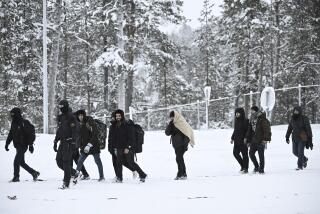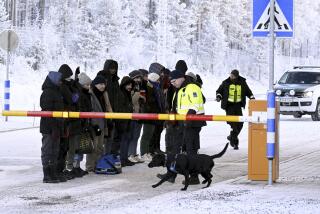Scores of Trucks Full of Alcohol Are Held at Russian Border
- Share via
KAZBEGI CHECKPOINT, Georgia — Truck driver Taimuraz Taimazov heats his spaghetti with a blowtorch. His kitchen table is a plank by the side of the road, and he sleeps in his cab in a long line of trucks parked near the Russian border.
For the past five weeks, the trucker has been stuck in this narrow mountain pass in a dispute with his native Russia, but he never lacks for something to drink: He is hauling 30 tons of nearly pure alcohol.
“I’ve been sitting here for more than a month,” said Taimazov, who has broken open his shipment to help pass the time. “If the alcohol was bad, we’d be dead by now.”
To Georgian authorities, Taimazov and his fellow drivers are law-abiding drivers carrying legitimate cargo. But to Russia, they are smugglers trying to sneak ethyl alcohol across the border for the manufacture of low-grade, illegal--and sometimes lethal--vodka.
Russian officials say the illegal trade in alcohol is costing the government nearly $6 million a day in lost tax revenue and contributing to a soaring increase in deaths across the nation from the consumption of poisonous moonshine vodka.
In mid-July, Russia closed its border with Georgia to trucks hauling untaxed and unlicensed alcohol. As a result, hundreds of Russian and Georgian trucks have been stuck for weeks at a time in a no man’s land at the Kazbegi border post, unable to enter Russia and unwilling to head back into Georgia.
“You call this a life?” asked Tamazi Khutashvili, a Georgian trucker stranded at a checkpoint where he has always been able to cross with shipments of alcohol. “We’ve been stuck here a month and a half already. We haven’t got any patience left. We’re like madmen.”
Russia’s refusal to allow the alcohol into the country--unusual enough in itself--has touched off a heated dispute with Georgia and created a bizarre scene at the Kazbegi border crossing, where truckers camp, drink and slaughter sheep for dinner near the ruins of a 12th century castle.
Georgian officials estimate that at least 500 trucks--and possibly more than 1,000--have been blocked from entering Russia, depriving the world’s most ardent drinkers of 10,000 to 20,000 tons of alcohol.
Some truckers have become so desperate to deliver their loads that they have offered border guards bribes of $10,000 a truck for permission to pass, officials say. Others have roamed around Georgia and into neighboring Azerbaijan, trying to find a way into Russia. Recently, Russian guards at the Verkhny Zaramag border checkpoint shot out the tires of three trucks when a small convoy tried to break through.
In a nationwide radio address, Russian President Boris N. Yeltsin defended the decision to keep out the trucks, saying that the production of illicit vodka in Russia is undermining legitimate, taxpaying distilleries and costing the government the equivalent of $172 million a month in lost tax revenue.
“State control over the alcohol market has virtually been lost,” Yeltsin declared. “I demand that order be introduced in the manufacture and sale of alcohol.”
In Soviet times, the president said, taxes on alcohol contributed 25% of Russia’s budget. Today, the amount has fallen to 5%. Funds that once supported the government now finance a vast network of bootlegging and other criminal activity, he said.
“The money goes to those who evade taxes for the manufacture or import of alcohol,” Yeltsin said. “The money also goes to corrupt staffers of law enforcement, to officials, and a great number of them profit from this business.”
Until Russia began its blockade, bootleggers were importing ethyl alcohol from at least 17 countries, including the United States and Canada. Typically, they would dilute the 96% pure alcohol with water, bottle it to look like legitimate brands of vodka, ship it to cities across the country and sell it at stores and sidewalk kiosks.
Russian officials say that 70% of all vodka sold in the country is now produced illegally in North Ossetia--a republic in southern Russia near the Georgian border. Most of the stranded trucks were bound for the republic.
With so much alcohol being produced without even token state inspections or health regulations, the number of deaths from alcohol poisoning has nearly tripled in the past five years, Yeltsin said.
Officially, the government estimates that 35,000 Russians died from alcohol poisoning last year--and some analysts put the number at many thousands more. Episodes of mass poisonings from tainted alcohol have become commonplace. Spot checks of vodka sold from street kiosks have found that up to 50% is unfit for consumption, Yeltsin said.
While the Georgian government does not question Russia’s right to halt the shipment of alcohol into the country, it is not happy about the way its giant neighbor is carrying out its new policy.
Instead of following the common practice of letting trucks reach the border post, inspecting them and seizing any illicit cargo, Russia has forced the trucks to remain on the Georgian side.
“They should be dealing with the problem on their side of the border, not ours,” protested Valery Chkheidze, chief of Georgia’s border guards.
The heavily loaded vehicles have taken up residence in the steep Caucasus Mountain gorge along the Terek River, parking in tunnels and on both sides of the roadway. Georgian officials worry that the huge quantity of highly flammable alcohol could result in a disastrous explosion, permanently shutting down the main road that leads from Russia to Georgia and Armenia.
Already, a rockslide has killed two truckers. A third driver died in an apparent suicide.
Georgia is also concerned that the episode has damaged its reputation as a country that promotes the free travel of goods through its territory. Calling itself a “transit state,” Georgia derives a large part of its tax revenue from cargo trucks that pass through on their way to Russia from Turkey or Black Sea ports. Georgia receives about $2.5 million a month just from trucks carrying alcohol into Russia.
“Georgia will suffer economic losses because of this,” said First Deputy Foreign Minister Mikhail Ukleba, who heads a Georgian commission assigned to resolve the dispute.
Some Georgians wonder whether Russia is trying to shift the alcohol shipments to its own Black Sea ports and cut Georgia out of the action.
In Moscow, Russian officials say they plan to keep the border shut tight to alcohol shipments.
“This moonshine will never make it into Russia, only over our dead bodies,” said Sergei D. Ivanchenko, chief spokesman for the Russian border guards. “The time has come to do things in the right way in Russia. Laws should be observed, and starting with vodka is not a bad choice.”
At the checkpoint, the truckers spend each day hanging out by the roadside, sitting at makeshift tables, complaining about their plight and pooling money to buy some bread or a sheep for their next meal.
Most of the trucks are parked along a two-mile stretch between the two nations’ border posts, having officially left Georgia but not yet entered Russia.
At the peak, there were more than 350 alcohol trucks parked in the area. But the number has fallen in recent days, in part because Georgia has ordered trucks licensed in its country to return south. But more than 170 trucks remain, in part because those licensed in Russia would have to pay a hefty return tax to Georgia if they turned around now.
Many of the drivers acknowledge that they do not have the required documents to prove that taxes have been paid to Russia for their shipments, but they are not concerned with whether their cargo is legal under Russian law.
As the nights get colder, some of the drivers have used alcohol from their shipments to heat their cabs by burning it in old soda cans. Others use it to keep warm the old-fashioned way: by drinking it.
Taimazov, the Russian trucker, said the owner of his shipment will not mind that he opened up one of the 200-liter barrels in his truck and helped himself.
“I think they will understand our predicament,” he said.
More to Read
Sign up for Essential California
The most important California stories and recommendations in your inbox every morning.
You may occasionally receive promotional content from the Los Angeles Times.













